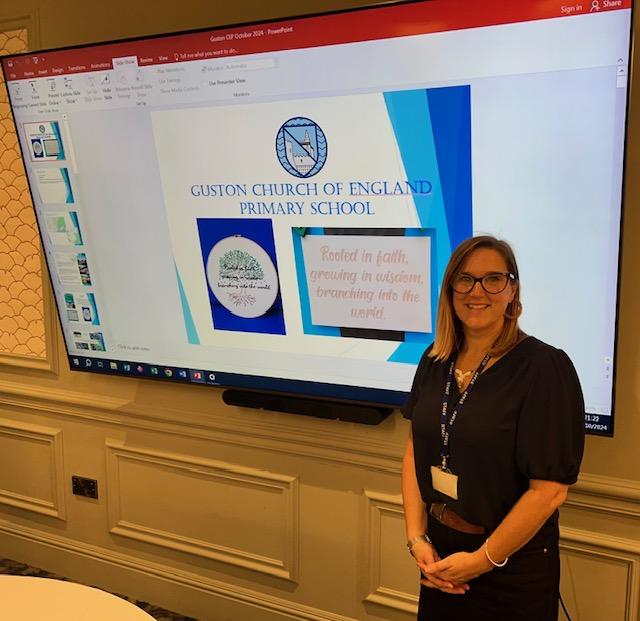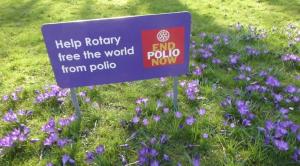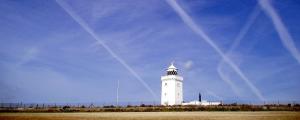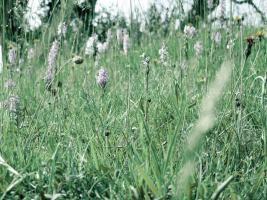An Exceptional School
Tue, Oct 29th 2024 at 1:03 pm- Tue, Dec 31st 2024 - 3:03 pm
Deby Day, Head of Guston Church of England Primary School, gives a detailed account of the character, strengths and challenges of her school.

An Exceptional School
The Headteacher of Guston Church of England Primary School, Deby Day, recently gave a talk about the school to the Rotary Club of South Foreland. This followed on from Rotary members Janet Dagys, Peter Sherred and John Dunkley, attending a school assembly early in the year to present a set of environmental books for the library.
Deby lived in the Dover area as a girl and attended Astor School. She became Headteacher of Guston School in 2008. The school is situated at the top of Old Charlton Road and near the demolished barracks adjoining Burgoyne Heights. Its pupil intake includes children from military families for some of whom English is their second language, as well as children from Guston and the surrounding area. Under the Afghan Resettlement Scheme, they also have children from British Army evacuees who were in danger from the Taliban regime, as well as Afghan families.
The school is therefore diverse and multicultural which is a challenge but creates a rich environment of cultures which brings mutual understanding to children of different backgrounds. The school vision is: ‘rooted in faith, growing in wisdom and branching into the world’, which works for Christians and other faiths (Hindu, Moslem, some Buddhists and some of no faith). The school rules are brief and friendly with clear expectations and flexibility: their aim is to help children manage their own behaviour.
Guston School is a vibrant community where everyone is welcome, valued, and encouraged to understand, tolerate and accept others. A good example of this inclusiveness is Sports Day when the morning programme of athletics is followed in the afternoon by a picnic when families bring traditional foods and customs.
Inclusion is at the heart of what the school does so there is a Deputy Head for Inclusion as well as one for Teaching and Learning. Then there is the Teaching Team, the Teaching Assistants, the Special Education Needs and Disabilities Team, which, with other support workers make up a staff committed to doing their best for all the children. Special needs and disabilities, including autism, ADHD, speech and language, and English as a Second Language need much attention in terms of finance and staff training. There is debate whether children with severe autism should be taught in mainstream schools. The increase in diagnosis of children with autism each year places great demands on classrooms in mainstream schools. What is important is that there are support staff for these children.
Reading is extremely important and beneficial to pupils’ development. Some families don’t read or don’t read phonetically so phonics has to be taught. Space is devoted to enable pupils in years 1 and 2 to access the Accelerated Reading Scheme. This room also provides ’nurture’ space for children in years 1 and 2 who cannot access the main classes, providing a less formal environment similar to reception class. This is work in progress. Grants from ‘Virtual Schools Kent’ help to provide ‘safe space’ off timetable for children who are gradually integrated into other classes when they are ready. This is also a ‘respite’ area at lunchtime for children who can’t cope with the playground.
The school has plenty of outside space, including astro turf for use in all weathers. There is a large field, a science garden, and a garden club at lunchtime. The forest area, with outside classroom, canopy and firepit went out of use during covid time but the intention is to get it started again.
Because of the importance of physical activity to well-being, the school receives premium money which has to be spent on Physical Education, different sports and play activities. This happens mainly at lunchtime and is very costly as regards equipment and Continuing Professional Development for staff, so the school will try to find its own resources. The Friends of Guston School will raise money for storage sheds for equipment and the school is looking for such things as old tyres and guttering, as materials for constructing a sandpit. A notable benefit of such physical activity is to see older children playing happily with younger ones, including those with complex needs.
Links with Guston Church recognise the multicultural nature of the school. For example, a multicultural Christingle Service is held in the church for year 6 pupils who then lead this service back at school in assembly. The children love it. This approach is also used with the Nativity Play and Harvest Festival, as further examples. Other religious festivals are celebrated in assembly, such as Eid when children tell of this festival, its food and customs. This cultural diversity enables children to see similarities between faiths and to learn toleration of differences.
It is difficult to integrate some families who are new to the UK and know nothing about schools here, such as the Afghan families. Parents have a right to withdraw their children from religious education. At first, they were resistant to the Christian ethos and would say no to taking part in anything relating to it. Deby found that a ‘softly, softly’ approach to introducing the Christian values of the school worked best. Meeting with families individually and getting them to list everything they were nervous of about Christianity helped over time and many parents allowed their children to take part in activities, such as the Nativity Play. Community cohesion is important and encouraged by events such as the Afghan-English Friendship Evening based on food.
The school works with other agencies such as Kent County Council and Dover District Council. Most importantly it works with the Ministry of Defence as army families come and go which is challenging both socially and for teaching. It also makes financial planning difficult as the school’s funding is based on the number of children on roll in October for the following April but the school roll may fluctuate considerably and this may not reflect the number of children it will have then.
To summarise, the main challenges facing the school are: the mobility of service families which means that children come and go, and the effect of this on planning: the number of children for whom English is a second language; creating religious and cultural inclusion while maintaining a distinctive Christian character. There is also the varied provision needed for children with Special Educational Needs and Disabilities. Some parents are reluctant to accept that their children need support, though this is improving.
The strengths of the school are its amazing children with their high aspirations and their supportive families. There is good communication between parents and staff: this is helped by Deby’s open-door policy which makes parents feel that they will be listened to. They know that if problems arise the staff will do something to help resolve them.
Deby was thanked for her detailed presentation which reflected her commitment, enthusiasm and leadership skills; these have resulted in the staff doing their utmost for the good of all the pupils and their families. She also gave an idea of the complexity of modern primary education compared with the primary education experienced by her somewhat older listeners.
'What We Do' Main Pages:

Contact us if your school would like to get involved with growing crocuses and helping to end Polio.
more

